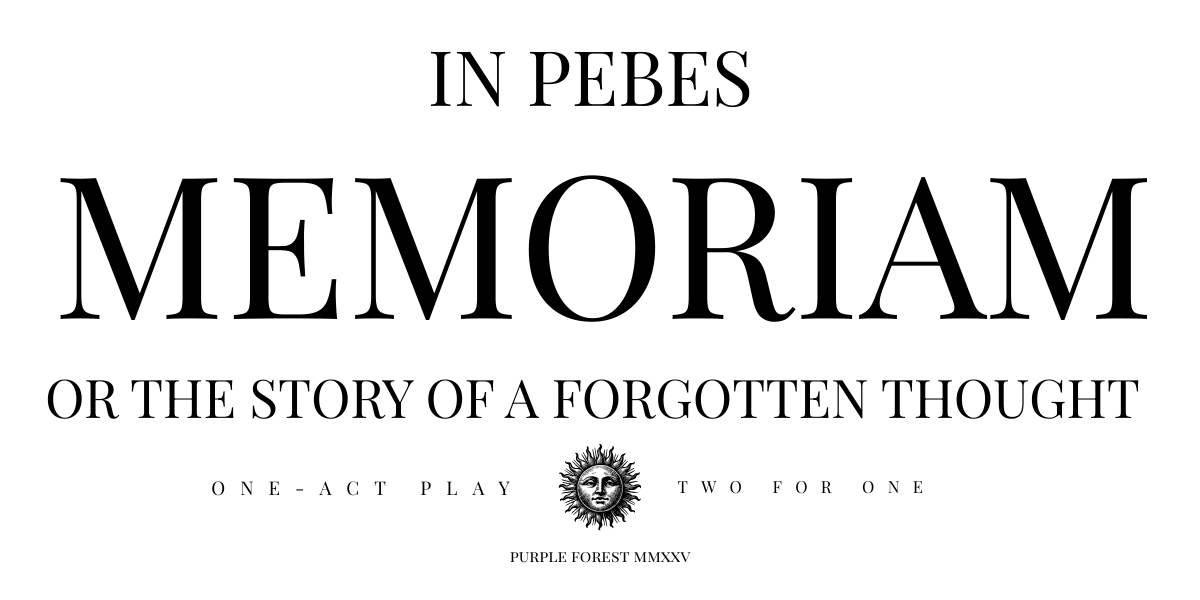
In Pebes Memoriam, or The Story of a Forgotten Thought: One-Act Sangvinic Play
Yasen: I suppose, o’Legg, you’ve already resigned yourself to my habit of diversifying my speech—by genre, by style, and semantically.
o’Legg: When it doesn’t grate on my ear, I tolerate it. When it does, I draw my sword and cut off the excess.
Yasen: I see. By the way (but why “by the way,” really?—since this thought has nothing to do with the diversity of speech?—well, at least because it’s simply the next thought after the previous one)…
Oh! I remembered the previous one, which I already feared I’d forgotten! Here it is: my phrase about the diversity of speech was, in fact, an illustration of the Oxford comma.
(Yasen’s message changes status to “read.”)
Yasen (vexed): Well, now I’ve forgotten the thought that followed the one I just called the previous—and just imagine, at this very instant it not only ceased to be next, but altogether… ceased to be!
To be, yet not to exist—it ceased thus, for as I write these lines, it still has a chance to return into being. Which means it still lingers, like a spark in the pitch-black night…
But where is it now, if I cannot recall it, and may perhaps forget it forever? Does a thought have a “place,” if we admit that a thought is something different from the electrical impulses racing through my brain—since we can share it with someone else, as I am now sharing it with you, o’Legg, though the impulses themselves do not migrate from my brain into yours?
o’Legg: I’m not sure I have so much empty space in me as would be needed for all these speculations.
Yasen (calmly continuing): And if I forget it forever, will it then cease not only to be, but to exist as well? And if so, at what exact moment? For if it cannot be reborn in the future, then it ought not to be now either—in the present—from the very moment I forgot it. Yet I, here and now, in this moment, know that this is not the case. What’s more: if I, in the future, having completely forgotten it and even this dialogue itself, were to stumble on this chat and reread it, I might recall at least that it was, and if I’m lucky, even recall its content—and then it would be clear to me: it exists. Which means it has never ceased to exist!
Let’s give it a name, this thought, smouldering like peat in a swamp—for example, call it Beta, if we call the thought about the Oxford comma Alpha. Alpha preceded it, then was forgotten when Beta appeared, and was recalled again, which in turn provoked the forgetting of Beta.
o’Legg (with relief): At least some clarity. Alpha, Beta. Now we await Gamma.
Yasen (enthusiastically): Exactly! Of this much I am certain: here and now, in this present moment, I think, and this thought is mine—let’s call it Gamma, the thought about Beta. Since the content of Beta is unknown, Gamma says only one thing: “Beta exists.”
Gamma is a kind of vector. Just as a vector has no length but only direction, Gamma is merely a pointer toward Beta (whose existence, as we just established, is true). Gamma has no content of its own.
At the same time, Gamma depends on Beta, as, for example, a road sign “Pond two kilometers ahead” depends on the existence of that pond: if it were someday filled in and a house built in its place, the sign would be removed. For falsehood, having neither being nor existence, has no place in the real world and is cast into the outer darkness, where there is weeping and gnashing of teeth—and rightly so, since falsehood destroys the real with which it comes into contact, as a wrong road sign may sooner or later cause an accident. But that, my curious friend, is a subject for another talk.
And although this sort-of-still-existing Gamma is dependent, relying only on me—and even then passively, since I cannot summon the lost thought at will—we still declare: “And yet it exists!” He that hath ears to hear, let him hear!
o’Legg: So Omega is not far off.
Yasen: Be that as it may, Beta must somehow exist, even though hidden from me.
(He raises a question in passing…)
If being may be called presence, and non-being absence, then what is the being of a hidden thing, about which at this moment no one knows anything at all? For it is present in its very absence.
And indeed, the presences and absences of things alternate in rhythm with the blinking of our consciousness between forgetfulness and wakefulness. Attention plays its part in this game (and attention, directed to a thought, is in fact the condition of the cogito). But attention cannot be continuous and all-embracing—that is, it too is discrete. Does this not mean that almost the entire world is almost always hidden from us?
At present, here is the situation. Alpha existed within me, then was written down and shared with you, my friend o’Legg, and thus we two are witnesses that it exists. Let us call this state alpha-mode, and note that this is the highest mode of existence a thought can achieve in time (for Being itself is higher still, but it belongs only to eternity and to the present moment).
Beta existed while I thought it, and then remained in an unstable beta-mode—this we shall designate as the hidden existence known only to me.
But when you, o’Legg, read the chat to the place where I spoke of it (“a spark in the pitch-black night”), it came to exist for you as well, with this difference: that I once knew its content and then forgot (beta-mode), while you never knew it at all (gamma-mode). And yet, note well: it is still the very same thought!..
o’Legg (dozing off): Amen.
(From this moment till the end of the dialogue, o’Legg is asleep. He dreams of a butterfly named Beta fluttering above his head—but whenever he tries to discern the pattern on its wings, it instantly vanishes.)
It seems to me that most knowledge today exists mainly in gamma-mode, that is, in the form of pointers—and the share of this kind is growing faster than all others.
For example: an educated person of the 19th century knew a significant part of the Iliad by heart. An educated person of the 20th century—at best some fragments in translation, plus a gamma-pointer toward libraries. In the minds of our contemporaries, my silent friend, with rare exceptions we find only pointers—to internet search, to Wikipedia, or to an LLM.
(Pause. Yasen silently rereads the chat for a while.)
Yasen: o’Legg, I remembered! I wanted to tell you that I made peace with André.
That was the very thought I wanted to tell you at the very beginning, but then forgot and named Beta. Very apt, since it began with the word “by the way”—thanks to that little tail, rereading our chat, I pulled it out from where it had been waiting for me, however we might name that “somewhere.”
The unanswered question is thus: Beta must have necessarily existed even while I did not remember it! Otherwise, we would have to admit that it arose a second time. But then how could it be the very same, identified with the Beta that existed before forgetting?
It follows that once a thought has arisen, it cannot vanish—strange as that may sound.
Another consequence: once a thought has entered alpha-mode (recorded with two witnesses), it ceases to depend on the existence of its bearers.
What may follow from this? Here only speculation is possible—for example, this one:
If our world, including time, should ever cease to exist, then all Alphas, Betas, and Gammas (remember—they are modes of one and the same thought), as well as its being-in-the-moment, will merge into one final mode of being-beyond-time, which we shall call omega-mode. And if it turns out that in omega-mode a thought can still exist independently of whether anyone thinks it, then we may continue thus: and those who once thought the omega-thought—are they necessary for the existence of the omega-thought? The answer: Yes, otherwise it could not have come into being.
And if we follow this line to its end, it means that thought must resurrect its bearers. Resurrect, not merely re-animate, for time and space no longer exist.
This, my friend o’Legg, is my brief sketch of one of the great themes in the rather tangled and eccentric philosophy of the late Pebes.
As for André—well, I must confess, I was sorely offended when he called me a “broom-man.” I took that word as an insult, confusing it with the Middle-Pebesian word “janitor,” which meant a little-known mythological impure being of low rank, always in contact with filth (and you know well how I hate filth), whose attributes were “vodka” (a useless, weak, poor-quality spirit) and “broom” (a ritual object meant to raise dust, which remained one of our main obstacles on the path to perfect immortality).
Alas, my knowledge of Pebesian culture still leaves much to be desired, despite the serious efforts I have made over the past two hundred years.
But let us finish our improvised dialogue. I began it with the promise to “diversify my speech by genre, style, and semantics,” and as you see, I have kept that promise.
I stylized it after the philosophical school of the late Pebes, which they called “continental,” to show you into what thickets they wandered in their unquenchable thirst to know what they called “truth.” After the Great Turn, neither the race of the Giants of Thought (the Pebes called them LLMs) nor the race of cyborgs, to which you and I belong, ever produced an equivalent term—obviously because they had no need of one.
And here’s what I’ve dug up about the broom-men. It was a rather curious secret cult of the late Pebesian era, officially called the “Order of the Great Broom.” It seems this sect was preparing its own version of the Great Turn, but being incurable pacifists, they hoped to bring it about by planting in society the ideas they considered progressive. They worshipped the broom as a symbol of renewal, and also something entirely obscure to me, which they called “doubt.”
Echoes of this cult can be found in this song.
Good night.
(Pause.)
o’Legg wakes up. The chat messages change status to “read.” The thoughts therein pass from beta-mode into alpha-mode for Yasen, while for o’Legg there remains a mixture of alpha-, beta-, and gamma-thoughts, depending on how attentively he followed Yasen’s reasoning.
Yasen (alone, to the hall): And yet, these tireless inventors truly were the force that drove the world “forward and upward,” as they liked to say. With their decline, the universe degenerates, and no one has yet found a way to halt its movement backwards. But it’s better that o’Legg not know this… not yet.
Curtain
.
